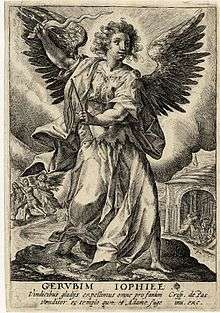Jophiel
The angel Jophiel (Heb. יוֹפִיאֵל, "beauty of God", "divine beauty"), also called Iophiel, Iofiel, Jofiel, Yofiel, Youfiel, Zophiel (Tsophiel צֹפִיאֵל, "spy of God", "watchman of God") and Zuriel (Tsuriel צוּרִיאֵל, "my rock is God"), is the archangel of wisdom, understanding, and judgment. He is listed as one of the Seven Archangels in Pseudo-Dionysian teachings.
In religious and magical lore

According to the pseudepigraphal Revelation of Moses, another name for Jophiel is Dina. Jophiel/Dina is described as an angel of the seventh heaven, a Cabalistic guardian of the Torah (and wisdom itself), who taught 70 languages to souls at the dawn of creation.[3] The Zohar lists him as a Great Angel Chief in charge of 53 legions who superintend Torah-readings on the Sabbath.[4] Jophiel is said to be a companion to the angel Metatron.[2]
C.E. Clement, in his book 'Angels in Art,' names Jophiel as the teacher of Ham, Japheth, and Shem.[2] Heinrich Cornelius Agrippa[5] and Thomas Rudd likewise name Jophiel as the teacher of Shem.[6]
Jophiel is an Archangel of the Kabbalah (though some systems put Raziel in his place) and in several listings including that of the early medieval theologian Pseudo-Dionysus.[7] The Calendarium Naturale Magicum Perpetuum lists Jophiel as the angel of the Sephira Chokhmah,[8] as do the Key of Solomon variant "The Veritable Clavicles of Solomon,"[9] and the Sixth and Seventh Books of Moses,[10] both latter works derived from the Calendarium.[11] Agrippa attributes Jophiel to Saturn, while Paracelsus assigns him to Jupiter.[2] Rudd attributes the Zodiac to Jophiel[12] along with the Sephira Binah instead of Zaphkiel.[13] Athanasius Kircher names Jophiel as "Angelus pulchritudinis," angel of beauty.[14] According to Robert Ambelain, Jophiel is in charge of the Cherubim, particularly the Shemhamphorasch angels Haziel, Aladiah, Lauviah, Hahaiah, Iezalel, Mehahel, Hariel, and Hakamiah.[15]
In literature
Angels of Love and Light describes him as "the Archangel of Paradise and the Patron of Artists and Illumination. He teaches the outer consciousness the Power of Light within oneself. He is also described as "the Yellow Ray of Wisdom, Illumination, and Constancy", and lists his Archeia as Christine also says
| “ | He Stirs feelings through Radiation of Illumination and into aspiration for spiritual things. He helps in absorbing information, studying for and passing tests, dissolution of ignorance, pride, and narrow-mindedness, and exposure of wrongdoing in governments and corporations. Jophiel helps in fighting pollution, cleaning up our planet and brings to mankind the gift of Beauty. He also provides inspiration for artistic and intellectual thought providing help with artistic projects and to see the beautiful things around us. | ” |
John Milton, in his poem Paradise Lost, mentions that Zophiel is "of cherubim the swiftest wing" (Paradise Lost VI, 535).
Zophiel is the subject of a poem by Maria Gowen Brooks.
In Good Omens, the angel Aziraphale takes the role of Jophiel, guarding the Garden of Eden with Flaming Sword, although he gave the sword to Adam and Eve after they were expunged from Eden.
References
- ↑ Lawrence, Robert M. (1898), The Magic of the Horse-Shoe, With Other Folk-Lore Notes, Chapter III: The Number Seven at sacred-texts.com
- 1 2 3 4 Davidson, Gustav (1967), A Dictionary of Angels, Including The Fallen Angels, Entry: Iofiel, Free Press, p. 150, Library of Congress Catalog Card Number: 66-19757, ISBN 9780029070505
- ↑ Gaster, Moses (1893), "Hebrew Visions of Hell and Paradise," in the Journal of The Royal Asiatic Society, p. 579, at www.sacred-texts.com
- ↑ Davidson, Gustav (1967), A Dictionary of Angels, Including The Fallen Angels, Entry: Iofiel, Free Press, p. 320, Library of Congress Catalog Card Number: 66-19757, ISBN 9780029070505
- ↑ Heinrich Cornelius Agrippa, Three Books of Occult Philosophy, Book III, Part 1, ed. Joseph Peterson, hosted at Twilit Grotto Esoteric Archives.
- ↑ A Treatise on Angel Magic, by Thomas Rudd, ed. Adam McLean, p.25 & 204, (two editions):
- Phanes Press, 1990
- Red Wheel/Weiser, 2006
- ↑ Davidson, Gustav (1967), A Dictionary of Angels, Including The Fallen Angels, Appendix, Free Press, p. 338, Library of Congress Catalog Card Number: 66-19757, ISBN 9780029070505
- ↑ The Magical Calendar, by Johann Baptist Grossschedel (two editions):
- ed. Adam McLean, Phanes Press, 1994, p. 91;
- ed. Joseph Peterson, hosted at Twilit Grotto Esoteric Archives
- ↑ The Veritable Clavicles of Solomon, anonymous, ed. Joseph Peterson, hosted at Twilit Grotto Esoteric Archives
- ↑ The Sixth and Seventh Books of Moses (part 2), anonymous, ed. Joseph Peterson, hosted at Twilit Grotto Esoteric Archives
- ↑ The Magical Calendar, Peterson edition introduction
- ↑ Rudd, McLean, pp.100 (2006 ed), p.101 (1990 ed)
- ↑ Rudd, McLean, p.204 (1990, 2006)
- ↑ "Cabala Hebraeorum" in Oedipus Aegyptiacus, by Athanasius Kircher, ed. Joseph Peterson, hosted at Twilit Grotto Esoteric Archives
- ↑ The Complete Magician's Tables, by Stephen Skinner, Golden Hoard Press, 2006, p.41
Further reading
- Fischer, Lynn (1996), Angels of Love and Light [with original paintings of the Seven Beloved Archangels and Their Archeiai by Marius Michael-George], Transformational Media Publications, South Yarmouth, MA
- "Jophiel," Pearls of Wisdom, Volume 7 Number 43, 1994, The Summit Lighthouse, Copyright © 1997 Church Universal and Triumphant
- "Seven Beloved Archangels Speak," 1954, The Bridge to Freedom
